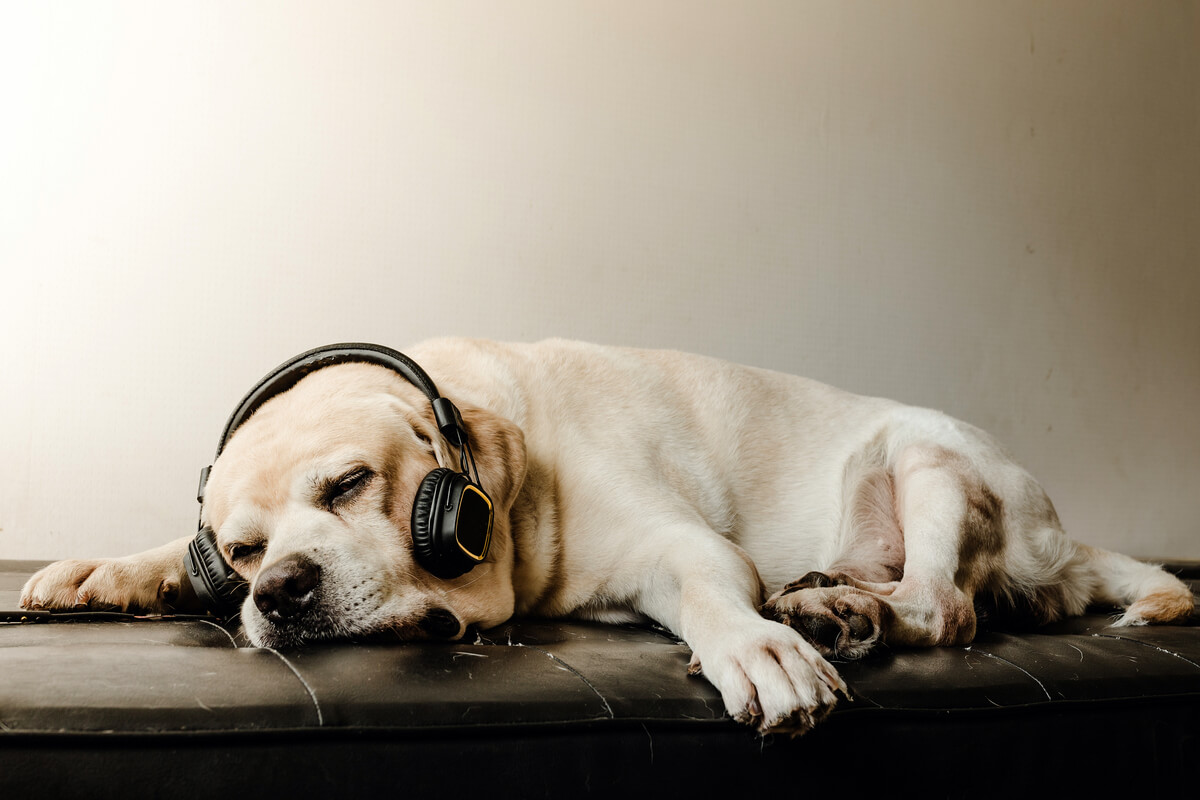Relaxing Music for Anxious Dogs

Just like humans, dogs can suffer from various types of mental and emotional problems. One of the most frequent is anxiety, which appears when the pet’s basic needs aren’t completely fulfilled. For this reason, different treatments have been proposed for anxious dogs, ranging from aromatherapy to the use of relaxing music.
Although it may not seem like it, anxiety is a serious disorder that can be quite detrimental to the pet’s health. This often causes inappropriate behavior such as aggressiveness, destruction of objects, and even self-mutilation. Keep reading and discover how to deal with anxiety in dogs with relaxing music.
Why do dogs suffer from anxiety?
Anxiety in dogs is a mental condition that is characterized by restless, nervous, and insecure behavior. It’s usually associated with excessive fear of an object, situation, or person. This condition manifests itself through negative and destructive behavior, which arises because the dog is unable to control its emotions.
Causes of anxiety in dogs
There are many causes that can cause anxiety in dogs. Among the most common are:
- Separation anxiety: This occurs due to excessive fear of loneliness, which causes dogs to feel anxious whenever their owners leave them alone.
- Lack of socialization: This causes dogs to dislike interaction with new people and animals, which generates stress and anxiety.
- Loud noises: Dogs’ ears are more sensitive than a human’s, which makes them more prone to be frightened by loud or sudden noises. For example, fireworks, some household appliances, and even car horns.
- Changes in their environment: Dogs love to form habits and get used to their surroundings, so, in some cases, they may feel anxious about moving or drastic changes in their home.
- Lack of exercise: If pets don’t use up their energy during the day, it accumulates and can lead to anxiety.
- Traumatic events: The experience of traumatic events, such as mistreatment or beatings, could cause dogs to be excessively fearful when they encounter similar scenarios. As a consequence, anxiety is generated.

How is anxiety in dogs treated?
Treatment for anxious dogs depends very much on the severity of the symptoms. In mild cases, increasing the amount of time owners and their pets spend together may reduce or completely eliminate the condition. However, in severe cases, the best course of action is to see a veterinarian. Some of the most commonly used strategies to treat canine anxiety are:
- Changes in routines: To correct anxiety problems, the dog needs to be distracted with games, walks, and various physical activities. This helps the dog’s mind to calm down and relax.
- Use of drugs: If anxiety causes severe problems such as aggressiveness or self-mutilation, the specialist could propose the use of drugs to reduce its activity.
- Use pheromones: Like drugs, pheromones are intended to relax the dog and prevent anxiety episodes.
- Alternative therapies: In addition to the above, specialists may suggest alternative therapies to support the treatment of anxiety, such as aromatherapy or music therapy.
Music therapy in dogs
Music therapy has been shown on several occasions to have positive effects on humans. It can help with chronic pain disorders, high blood pressure, anxiety, and other emotional conditions. It has become quite popular because its costs virtually nothing and it something that’s accessible to most people.
In the case of dogs, the hope is that it would have a similar effect in helping them to correct certain health problems. However, the auditory perception of pets is different from that of humans, so there are likely to be differences in the benefits that music therapy can provide.
In fact, even though there are few studies that support the benefits of using soothing music in anxious dogs, it’s still something that clinic often recommend. This is because many people have found that music therapy has successfully reduced stress and anxiety in dogs, but the real impact on canine behavior is still unknown.

What kind of music does a dog need?
Not all music currently available is suitable for music therapy. In fact, in most of the research that has been conducted, classical music has been shown to reduce stress levels in anxious dogs.
Of course, there are several genres of music that aren’t known to have an impact on dogs’ mental health. However, some specialists believe that dogs may have certain preferences that enhance the impact of relaxing music on anxious dogs. Therefore, it’s advisable to vary the music genres a bit, as long as they’re calm and comforting pieces.
Thanks to today’s technology, different music apps have playlists focused on relaxing music for anxious dogs. So, if your pet suffers from anxiety, you could try playing this type of music to help them. Of course, it’s also essential to have a check-up with a specialist, as only then will you know what their progress is, and recommendations to improve their overall health.
All cited sources were thoroughly reviewed by our team to ensure their quality, reliability, currency, and validity. The bibliography of this article was considered reliable and of academic or scientific accuracy.
- Bowman, A., Scottish, S. P. C. A., Dowell, F. J., & Evans, N. P. (2015). ‘Four Seasons’ in an animal rescue centre; classical music reduces environmental stress in kennelled dogs. Physiology & behavior, 143, 70-82.
- McDonald, C. I., & Zaki, S. (2020). A role for classical music in veterinary practice: does exposure to classical music reduce stress in hospitalised dogs?. Australian veterinary journal, 98(1-2), 31-36.
- Lindig, A. M., McGreevy, P. D., & Crean, A. J. (2020). Musical dogs: A review of the influence of auditory enrichment on canine health and behavior. Animals, 10(1), 127.
